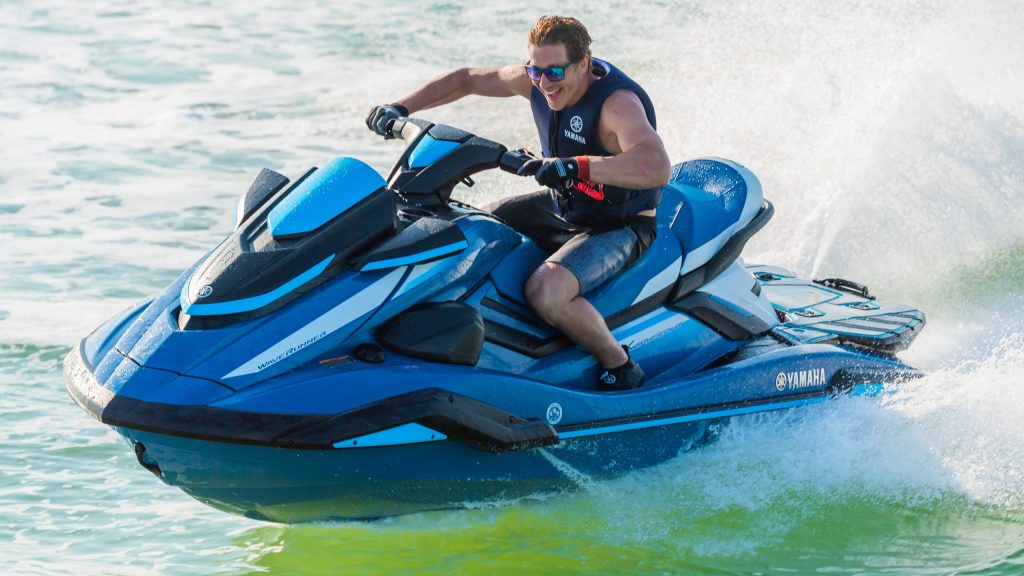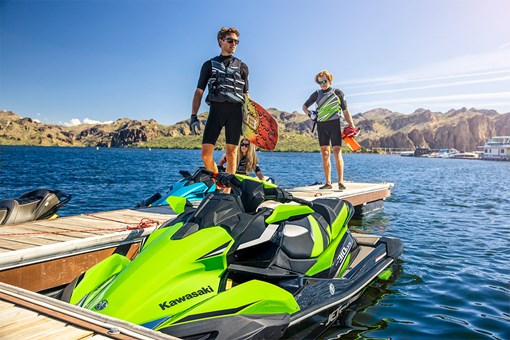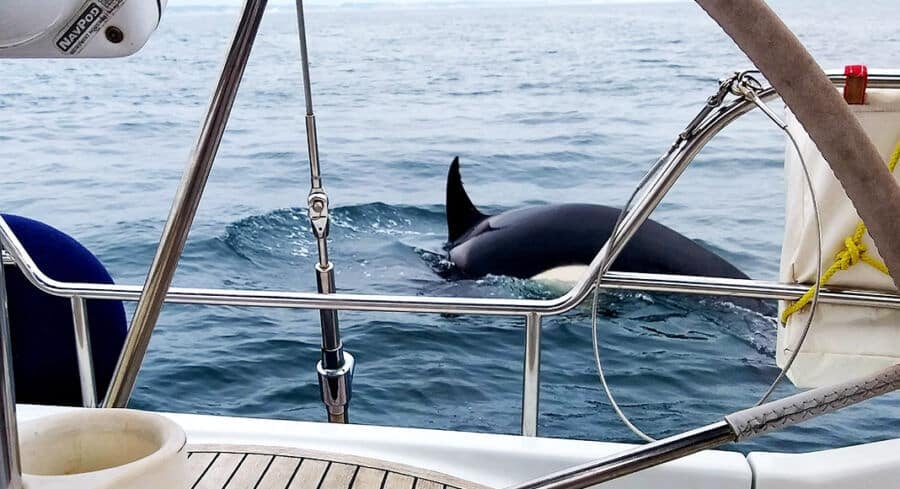In Florida: Minimum Legal Age for Personal Watercraft Operation Revealed
In Florida, boating is a popular activity enjoyed by locals and tourists alike. With its sunny weather and numerous waterways, it's no wonder that personal watercraft (PWC) are a common sight on the state's lakes and coastal waters. As with any recreational activity involving the use of motorized vehicles, safety is of the utmost importance.

For this reason, Florida has established several regulations regarding the operation of PWCs, including the minimum legal age requirement.
Individuals must be at least 14 years old to operate a PWC in the state of Florida. No one under 14 years of age may operate any PWC on Florida waters at any time, even if they possess a Florida Boating Safety Education ID Card.
Furthermore, PWC rental companies are prohibited from renting to anyone under 18 years of age, ensuring the safe and responsible use of these watercraft.

Key Takeaways
- The minimum legal age to operate a personal watercraft in Florida is 14 years old.
- PWC rental companies cannot rent to anyone under 18 years of age.
- Florida Boating Safety Education ID Card is required for PWC operators aged 14 and older.
Minimum Legal Age Requirement
Age Restrictions for PWC Operation
In Florida, the minimum legal age to operate any personal watercraft (PWC) is at least 14 years of age. This age requirement is set to ensure the safety of both the operators and other people sharing the waterways.
It is important to note that individuals born on or after January 1, 1988, are required to have successfully completed a National Association of State Boating Law Administrators (NASBLA) approved boating education course or have passed a course equivalency or temporary certificate examination before operating a PWC.
Anyone under the age of 18 years is prohibited from renting or leasing a PWC, but they can operate a rented PWC if someone 18 years or older has rented it. The legal age for entering into a rental contract for a PWC is 18 years.
Legal Penalties for Underage Operation
Florida law stipulates that it is illegal for anyone under the age of 14 years to operate a PWC, even if they possess a Boating Safety Education I.D. Card. Violating this law can result in legal consequences, including fines and potential legal actions against the owner of the personal watercraft if they knowingly allowed an underage operator.
Enforcement officers carry out regular checks to ensure that operators of PWCs are compliant with the age restrictions in place. It is crucial for both operators and PWC owners to adhere to these legal requirements to avoid penalties and ensure the safety of everyone on the water.
Boating Safety Regulations
Education Requirements
In Florida, the minimum legal age to operate a personal watercraft (PWC) is 14 years. However, individuals born on or after January 1, 1988, must possess a Boating Safety Education ID Card to operate a vessel powered by a motor of 10 horsepower or greater.
To obtain this card, boaters need to complete a NASBLA (National Association of State Boating Law Administrators) approved boater education course. The Florida Fish and Wildlife Conservation Commission (FWC) is responsible for managing boating safety course requirements.
Equipment and PFD Usage
Florida law mandates the use of personal flotation devices (PFDs) or life jackets while on board a PWC.
There are different types of approved PFDs, such as:
- Type I: Offshore life jackets
- Type II: Near-shore vest
- Type III: Flotation Aid
- Type IV: Throwable Device
- Type V: Special-use devices
All PFDs must be Coast Guard-approved, and users should choose PFDs based on the intended water activity and the specific watercraft.
Life jackets must be in good condition, readily accessible, and properly sized for each passenger. Inflatable PFDs are not recommended for PWC operators or passengers.
Operating and Safety Procedures
Safe operation of a PWC is essential for the well-being of both the operator and surrounding vessels.
Florida law prohibits reckless operation of a PWC, such as weaving through congested waterway traffic or jumping the wake of another vessel.
Operators must follow proper safety procedures when navigating the waterways, paying attention to signs and buoys, and respecting the right-of-way rules.
Additionally, PWCs must be equipped with an engine cutoff switch or lanyard that immediately stops the engine if the operator falls off.
Ensuring that the engine cutoff switch is functional and correctly attached to the user's person or life jacket is vital for avoiding accidents.
PWC Rental Regulations
Requirements for Renting a PWC
In Florida, the minimum legal age to operate a personal watercraft (PWC) is 14 years old. However, for renting a PWC, an individual must be at least 18 years old1.
Anyone born on or after January 1, 1988, is required to have successfully completed a National Association of State Boating Law Administrators (NASBLA) approved boating education course or passed a course equivalency or temporary certificate examination2.
This requirement indicates that PWC renters must provide valid photo identification to verify their age and display their boating safety education before they can rent a PWC.
Responsibilities of Rental Facilities
Rental facilities play a crucial role in ensuring that Florida's PWC rental regulations are adhered to, by verifying the age and boating education credentials of potential renters.
Rental facilities must ensure that:
- The person renting a PWC is 18 years or older1
- Renters born on or after January 1, 1988, provide proof of successful completion of a NASBLA-approved boating education course or a temporary certificate examination2
- All renters are informed of Florida's boating rules and regulations.
Moreover, facilities should not rent or lease PWCs to individuals who cannot meet these requirements and should always check photo IDs thoroughly to confirm the age of the renter.
Ownership and Registration
When owning and operating a personal watercraft (PWC) or any other vessel in Florida, it is essential to understand the requirements for registration, ownership transfer, and titling. These processes ensure that your vessel is legally documented and ready for use on Florida waters.
Registering Your Vessel
In Florida, all vessels with motors, including PWCs, must be registered with the Florida Department of Highway Safety and Motor Vehicles.
To register your vessel, you will need to provide documentation such as the bill of sale, a certificate of title (if applicable), and proof of ownership.
Once registered, you will receive a certificate of registration and a decal, which must be displayed on your vessel.
When registering your vessel, make sure to carry the certificate of registration on board the vessel and make it available for inspection by law enforcement officers.
Registered vessels can be used for various activities such as fishing and other recreational purposes.
Ownership Transfer and Titling
If you purchase a vessel or PWC, the ownership transfer process includes obtaining the proper title and updating the registration with the new owner's information.
The bill of sale should contain the seller's and buyer's information, including names, addresses, and signatures.
The title should also be signed and completed by both parties.
In Florida, all vessels with motors, including PWCs, are required to be titled by their owners, regardless of their usage on the water.
Titling a vessel is important to establish legal ownership and provides proof in case of disputes.
When transferring ownership, make sure to adhere to Florida's boating safety requirements.
The new owner should also be aware of the minimum legal age to operate a PWC in Florida and ensure they have completed the necessary education or certification courses.
Enforcement and Compliance
Role of Florida Law Enforcement
Florida law enforcement officers, particularly the Florida Fish and Wildlife Conservation Commission (FWC), play an essential role in maintaining safety on the water by enforcing relevant laws and regulations concerning personal watercraft (PWC) operation.
Their role includes ensuring that operators meet the minimum age requirements, which state that no one under the age of 14 years may operate a PWC in Florida.
FWC officers and other Florida law enforcement officers are responsible for patrolling the waterways, investigating any incidents involving PWCs, and educating operators about the rules and regulations.
This includes informing them about the consequences of boating under the influence of alcohol or drugs, as it is illegal and dangerous.
Consequences of Non-Compliance
Non-compliance with Florida PWC regulations may result in various consequences for the operator.
One significant issue is boating under the influence (BUI) of alcohol or drugs, which has severe penalties, including jail time, fines, and loss of boating privileges.
Law enforcement officers may conduct sobriety tests for those suspected of BUI.
Other violations, such as reckless operation of a vessel or the illegal use of PWCs, may also result in penalties.
Penalties for these violations can range from warnings to citations, fines, and even suspension or revocation of the operator's boating privileges. The severity of the consequence depends on the nature of the violation and the individual's history of prior offenses.
Boating While Under the Influence
Florida takes boating safety seriously, and boating under the influence (BUI) is a major concern.
Legal Implications and Safety Concerns
Operating a boat while under the influence of alcohol or drugs is not only dangerous but also illegal.
In Florida, it is illegal to operate a vessel while under the influence of drugs or alcohol. A person can be convicted of BUI if they are operating a vessel while having a blood or breath alcohol concentration (BAC) of 0.08% or greater.
Boating under the influence can be based on actual drug or alcohol impairment or BAC (source).
It is important to note that there is no minimum age to operate a boat in Florida; however, the personal watercraft regulations and boating safety requirements are age-specific and must be followed (source).
Testing and Prosecution of Offenders
The Florida Fish and Wildlife Conservation (FWC) Commission works in cooperation with other law enforcement agencies to enforce BUI laws.
Officers may perform sobriety tests on suspected offenders and request a breath, blood, or urine test if they have probable cause to believe the operator is under the influence of alcohol or drugs (source).
Offenders may be subject to penalties such as fines, community service, and even imprisonment depending on the severity of the offense and their previous record.
Underage offenders (below 21 years old) with a measurable blood alcohol concentration (0.02% or higher) are subject to special provisions, including 50 hours of public service and mandatory attendance in an alcohol education program (source).
Safety on the Water
The state of Florida is known for its pristine waters and abundant opportunities for both recreational and professional boating. As you venture out on your personal watercraft (PWC), it's crucial to be aware of the regulations and safety measures in place to ensure a fun and safe experience on the water.
Navigational Rules and Lights
In Florida, PWC operators must be at least 14 years of age to legally operate the watercraft.
When operating a PWC, it is essential to be knowledgeable about navigational rules and lights to maintain a secure environment for all vessels on the water.
All PWCs, like other vessels, are required to display navigation lights between sunset and sunrise.
These lights help other boaters identify your position and movement on the water, preventing potential collisions. PWCs must have a red/green combination sidelight at the bow and an all-round white light at the stern.
Anchoring and Mooring Guidelines
Proper anchoring and mooring are important aspects of responsible PWC operation.
When anchoring, make sure to use a coast guard-approved anchor to secure your PWC.
This ensures stability and prevents potential damage to nearby vessels or the surrounding environment.
Always check the anchor line for wear and tear and replace it as necessary. Be mindful of the surrounding boats, swimmers, and structures as you set your anchor.
Reckless operation of a PWC includes, but is not limited to, actions such as weaving through congested areas, jumping wakes, or creating excessive speed or abrupt changes in direction.
These actions not only pose a danger to the operator and passengers but also other watercraft users and the environment.
Special Operating Conditions
Operating on Private Lakes and Ponds
In Florida, the minimum legal age to operate a personal watercraft (PWC) such as Jet Skis or WaveRunners is 14 years.
When operating PWCs on private lakes or ponds, make sure to follow the same age restrictions as on public waters.
It is highly recommended that operators possess a Boating Safety Education I.D. Card.
These cards are obtained after successfully completing a National Association of State Boating Law Administrators (NASBLA) approved boating education course.
Private lake or pond owners may also impose their own rules regarding the use of motorized vessels, including PWCs, on their property.
It is crucial for operators to respect and adhere to these additional regulations to ensure safety and minimize any disruption to the local environment.
High-Speed Craft and Sports
High-speed activities such as water skiing and wakeboarding require close attention to safety regulations and specific operating conditions.
In Florida, boat operators involved in towing activities like water skiing must be at least 14 years old and maintain a proper lookout for other watercraft, swimmers, or obstacles.
The towing vessel, in addition to the PWC, must also be equipped with a rearview mirror or have a separate observer on board to effectively monitor the skier's progress and guarantee their safety.
Moreover, it is vital to follow a safe distance of at least 100 feet from any dock, swimmer, or other boat while operating at high speeds or engaging in water sports activities.
As PWCs are commonly used for high-speed maneuvers and sports, operators should stay informed about any special regulations specific to these crafts.
For instance, PWCs must not be operated between 30 minutes after sunset and 30 minutes before sunrise. Proper safety equipment is also obligatory, such as life jackets and a sound-producing device, like a whistle, to signal other boaters in case of an emergency.
Boater Education and Certification
In Florida, the minimum legal age to operate any personal watercraft (PWC) is 14 years old source. However, there are certain education requirements and certifications that need to be met before an individual can legally operate a PWC.
Obtaining a Boating Safety Education ID Card
Boating safety is a priority in Florida, and the Florida Fish and Wildlife Conservation Commission (FWC) mandates that anyone born on or after January 1, 1988, must obtain a Boating Safety Education ID Card to operate a motorboat with 10 horsepower or more source.
To acquire the Boating Safety Education ID card, an individual must complete an approved boating education course, which includes the National Association of State Boating Law Administrators (NASBLA) approved course source.
After the successful completion of the course, the individual will receive their Boating Safety Education ID Card issued by the FWC.
Course Equivalency and Reciprocity
Florida recognizes boating education courses and certifications from other states if they meet the NASBLA standards and are also recognized by the respective state agenciessource.
This means that an individual who has completed an approved boating education course in another state may operate a motorboat in Florida without having to take a new course, as long as their certificate meets the necessary requirements.
Moreover, the FWC also allows course equivalency for those who have completed an equivalent course or temporary certificate examination in Floridasource.
Additional Regulations and Guidelines
Age-Specific Guidelines
In Florida, the minimum legal age to operate a personal watercraft (PWC) is 14 years old. However, there are specific guidelines for different age groups.
For operators under 14 years old, they may not operate a PWC at all. Those between 14-15 years old can operate a PWC if an individual 18 or older is on board with them, who is in a position to take immediate control of the PWC. When the operator is 16 years old or older, they can operate a PWC without adult supervision.
Vessel-Specific Regulations
Florida's boating laws also encompass regulations pertaining to specific types of vessels.
For instance, Type IV throwable PFD's are required for all vessels 16 feet or longer, excluding canoes and kayaks. All motorized vessels, regardless of size, must display a validation decal next to their registration numbers.
Boating Education and Licensing Outlets
Florida requires boater safety education for all vessel operators born on or after January 1, 1988.
Individuals must complete an approved boater safety course and obtain a Boating Safety Education Identification Card. Alternatively, they can pass a boater safety equivalency exam.
These courses and exams are available through various outlets, such as online providers, or in-person courses offered by organizations like the US Coast Guard Auxiliary.
To obtain a validation decal and register their vessels, boaters need to visit their local license plate agent or tax collector's office to complete the process.
Frequently Asked Questions
What are the age requirements for operating a PWC in the state of Florida?
In Florida, the minimum legal age to operate a personal watercraft (PWC) is 14 years old. Those born on or after January 1, 1988, must also have successfully completed an approved boating education course or passed a course equivalency examination.
How old must passengers be to legally ride on a PWC in Florida?
There is no specific age requirement for passengers to legally ride on a PWC in Florida. However, it is important for the operator to ensure that passengers are wearing appropriate life jackets and following safety guidelines for riding on a PWC.
What steps should be taken to safely reboard a PWC in Florida?
To safely reboard a PWC, follow these steps:
- Approach the PWC from the stern (rear), keeping the engine turned off.
- Grab the reboarding handle or handlebar and pull yourself onto the craft.
- Swing your legs onto the PWC and position yourself on your knees or seated on the vessel.
- Ensure that both passengers and operators are safely aboard before restarting the engine.
What are some examples of safe PWC operation practices in Florida?
Safe PWC operation practices in Florida include:
- Wearing a life jacket at all times.
- Observing all navigational rules and regulations.
- Maintaining a safe distance from other vessels, swimmers, and fixed objects.
- Using caution when operating in shallow waters or near docks.
What should you do if the engine of your PWC shuts off while operating in Florida?
If the engine of your PWC shuts off while operating, follow these steps:
- Stay calm and ensure that all passengers are safe.
- Check for any obstructions or debris in the water intake or jet pump.
- Restart the engine, if possible. If the engine doesn't restart, use a signaling device to alert other boaters of your situation and seek assistance.
What legal requirements must individuals born after January 1, 1988, meet to operate a motorized vessel in Florida?
Individuals born on or after January 1, 1988, must successfully complete an approved boating education course or pass a course equivalency examination to operate a motorized vessel in Florida.
Additionally, they must carry a Boating Safety Education Identification Card along with a photo ID while operating the vessel.
Charlie is Editor-in-Chief of Sea Magazine







